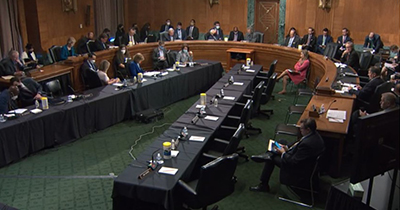
MBA, Trade Groups Urge Senate Banking Committee to Approve LIBOR ‘Tough Legacy’ Legislation

The Mortgage Bankers Association and nearly two dozen industry trade groups urged members of the Senate Banking Committee to support federal legislation to address “tough legacy” contracts that currently reference LIBOR.
With the U.S. transitioning away from LIBOR as early as June 2023, the Nov. 1 letter to Banking Committee Chairman Sherrod Brown, D-Ohio, and Ranking Member Pat Toomey, R-Pa., said legislation is needed to address trillions of dollars in outstanding contracts, securities and loans that use LIBOR for their interest rates, but do not have appropriate fallback language to transition away from LIBOR.
“Without federal legislation to address these contracts, investors, consumers and issuers of securities may face years of uncertainty, litigation and a change in value, creating ambiguity that would lead to a reduction in liquidity and an increase in volatility,” the letter said.
Last month, five federal financial institution regulatory agencies released a joint statement on managing the LIBOR transition. They noted, “failure to adequately prepare for LIBOR’s discontinuance could undermine financial stability and institutions’ safety and soundness and create litigation, operational, and consumer protection risks.”
In addition, at recent hearings before both the Senate Banking Committee and the House Financial Services Committee, Treasury Secretary Janet Yellen and Federal Reserve Chair Jay Powell and others endorsed federal legislative action.
Such legislation would appear to have broad bipartisan support. Sens. Jon Tester, D-Mont., and Thom Tillis, R-N.C., are lead cosponsors of proposed LIBOR legislation in the Senate. Designed as a companion piece to a House bill introduced by Rep. Brad Sherman, D-Calif., H.R. 4616, the Adjustable Interest Rate (LIBOR) Act of 2021, it would establish a process for certain financial contracts that do not contain sufficient fallback language to instead reference the Federal Reserve’s recommended alternative — the secured overnight financing rate, or SOFR—without the need for litigation.
Though not yet introduced, the Tester-Tillis bill would reportedly legislate the following:
1) Provide a solution for those contracts that have insufficient fallbacks and cannot otherwise be amended among the parties;
2) Limit the scope of legislation so there is no interference with any contracts that have effective fallback provisions, allows parties to opt-out of the legislation, and will not affect contracts related to new or future business;
3) Offer uniform, equitable treatment for all U.S. contracts that fall under the federal legislation; and
4) Create a safe harbor from litigation for parties that are covered by the legislation and prevents otherwise inevitable litigation costs and gridlock.
At a Banking Committee hearing on Tuesday, Brown and Toomey expressed support for such legislation. “If done right, this legislation can help borrowers who don’t have the ability to bargain with their student loan lender or mortgage banker, while also providing certainty to lenders,” Brown said. “We know we need to act, and I appreciate these efforts by members of our committee.”
“Banks should stop writing new LIBOR contracts as soon as possible, and federal legislation is likely needed to address tough legacy contracts,” Toomey said. “The unique and anomalous circumstances related to the LIBOR transition require action by Congress to amend contracts between private parties.”
“We do not take lightly the amending of contracts,” the letter said. “However, in this unique, once-in-a-lifetime financial event, we find no other feasible option for remediation of these tough legacy contracts without the risk of significant uncertainty and the potential for market disruption.”
The letter urged Committee members to work towards a “meaningful solution that offers fair, equitable and consistent treatment for all tough legacy contracts in support of the LIBOR transition.”
